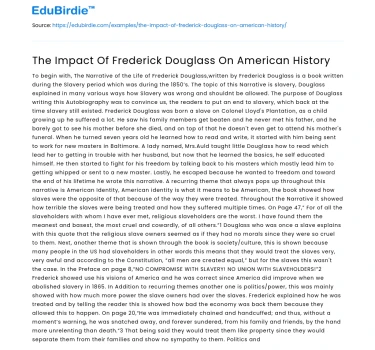To begin with, The Narrative of the Life of Frederick Douglass,written by Frederick Douglass is a book written during the Slavery period which was during the 1850’s. The topic of this Narrative is slavery, Douglass explained in many various ways how Slavery was wrong and shouldnt be allowed. The purpose of Douglass writing this Autobiography was to convince us, the readers to put an end to slavery, which back at the time slavery still existed.
Frederick Douglass was born a slave on Colonel Lloyd's Plantation, as a child growing up he suffered a lot. He saw his family members get beaten and he never met his father, and he barely got to see his mother before she died, and on top of that he doesn't even get to attend his mother's funeral. When he turned seven years old he learned how to read and write, it started with him being sent to work for new masters in Baltimore. A lady named, Mrs.Auld taught little Douglass how to read which lead her to getting in trouble with her husband, but now that he learned the basics, he self educated himself. He then started to fight for his freedom by talking back to his masters which mostly lead him to getting whipped or sent to a new master. Lastly, he escaped because he wanted to freedom and toward the end of his lifetime he wrote this narrative.
Save your time!
We can take care of your essay
- Proper editing and formatting
- Free revision, title page, and bibliography
- Flexible prices and money-back guarantee
A recurring theme that always pops up throughout this narrative is American Identity, American identity is what it means to be American, the book showed how slaves were the opposite of that because of the way they were treated. Throughout the Narrative it showed how terrible the slaves were being treated and how they suffered multiple times. On Page 47,” For of all the slaveholders with whom I have ever met, religious slaveholders are the worst. I have found them the meanest and basest, the most cruel and cowardly, of all others.”1 Douglass who was once a slave explains with this quote that the religious slave owners seemed as if they had no morals since they were so cruel to them.
Next, another theme that is shown through the book is society/culture, this is shown because many people in the US had slaveholders in other words this means that they would treat the slaves very, very awful and according to the Constitution, “all men are created equal,” but for the slaves this wasn't the case. In the Preface on page 8,“NO COMPROMISE WITH SLAVERY! NO UNION WITH SLAVEHOLDERS!”2 Frederick showed use his visions of America and he was correct since America did improve when we abolished slavery in 1865.
In Addition to recurring themes another one is politics/power, this was mainly showed with how much more power the slave owners had over the slaves. Frederick explained how he was treated and by telling the reader this is showed how bad the economy was back them because they allowed this to happen. On page 20,“He was immediately chained and handcuffed; and thus, without a moment’s warning, he was snatched away, and forever sundered, from his family and friends, by the hand more unrelenting than death.”3 That being said they would treat them like property since they would separate them from their families and show no sympathy to them. Politics and power impacted this because mostly everyone owned a slave, so this made political parties since later in history the north wanted to abolish slavery, but the south didn't so it caused a split.
Furthermore, some people read this narrative and wrote a book review on it,John R. McKivigan. 'INTRODUCTION: REDISCOVERING THE LIFE AND TIMES OF FREDERICK DOUGLASS.' The Journal of African American History 99, no. 1-2 (2014): 4-11. doi:10.5323/jafriamerhist.99.1-2.0004. This journal article reflects on the main key points on the narrative, such as: equal rights, women rights, and abolition of slavery. With his review on the narrative I agree with everything he said about Frederick Doulgass because he mostly summarized the book with facts. He also explains different essays about Frederick Douglass, these essays were for people to better understand the life of Frederick since some people misunderstood his autobiography.
Lastly, another review on this narrative is, by Ryden, Wendy. 'Conflicted Literacy: Frederick Douglass's Critical Model.' Journal of Basic Writing 24, no. 1 (2005): 4-23. http://www.jstor.org/stable/43443808. He explains how important it is for college students to do writing assignments because it can help them a lot in life by them being able to ask questions about the public and find new solutions to things. He used the narrative of Frederick Doulgass as a great example to prove his ideology of questioning what's right and wrong. I personally agree with what he is saying because there is evidence of this working and it made a huge impact on America's history, he also states, Page 6“Now I’ve come to realizing that reading, as well as studying the text, is the only thing that can help me succeed on the tests.”4He says that studying the text and reading more will allow your pass your tests, which I also agree with.
Conclusion
In Conclusion, Frederick Douglass lived a hard life and made a huge impact on America's history. Throughout his narrative he showed many different recurring historical themes some of them being: American Identity, society/culture and politics/power. In the book reviews I agreed with them because they said many good key points about how reading will allow you to open your mind more and Frederick Douglass is a perfect example of this since he made a difference in our history.






 Stuck on your essay?
Stuck on your essay?

